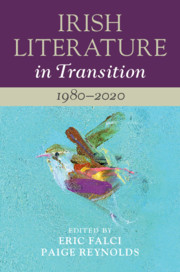Book contents
- Irish Literature in Transition, 1980–2020
- Irish Literature in Transition
- Irish Literature in Transition, 1980–2020
- Copyright page
- Contents
- Contributors
- Series Preface
- General Acknowledgements
- Acknowledgements
- Introduction
- Part I Times
- Part II Spaces
- Chapter 6 Habitations: Space, Place, Real Estate
- Chapter 7 Crossings: Northern Irish Literature from Good Friday to Brexit
- Chapter 8 Adaptations: Commemoration and Contemporary Irish Theatre
- Chapter 9 Relocations: Diaspora, Travel, Migrancy
- Chapter 10 Arrivals: Inward Migration and Irish Literature
- Coda: Tom Murphy and Brian Friel
- Part III Forms of Experience
- Part IV Practices, Institutions, and Audiences
- Index
Coda: Tom Murphy and Brian Friel
from Part II - Spaces
Published online by Cambridge University Press: 28 February 2020
- Irish Literature in Transition, 1980–2020
- Irish Literature in Transition
- Irish Literature in Transition, 1980–2020
- Copyright page
- Contents
- Contributors
- Series Preface
- General Acknowledgements
- Acknowledgements
- Introduction
- Part I Times
- Part II Spaces
- Chapter 6 Habitations: Space, Place, Real Estate
- Chapter 7 Crossings: Northern Irish Literature from Good Friday to Brexit
- Chapter 8 Adaptations: Commemoration and Contemporary Irish Theatre
- Chapter 9 Relocations: Diaspora, Travel, Migrancy
- Chapter 10 Arrivals: Inward Migration and Irish Literature
- Coda: Tom Murphy and Brian Friel
- Part III Forms of Experience
- Part IV Practices, Institutions, and Audiences
- Index
Summary
This coda places Brian Friel and Tom Murphy in dialogue in order to identify important distinctions and resemblances between two of Ireland’s most important playwrights. Friel is frequently considered more accessible but also more conservative; Murphy is generally described as being more bleak and also more innovative. The article acknowledges and explains the partial validity of those evaluations but also demonstrates their limitations, pointing to examples of Friel’s engagement in experimental practice as well as Murphy’s occasional fidelity to conservative forms (such as tragedy) and tropes (such as the Irish country kitchen). It also points to important overlaps in their interaction with key companies such as Field Day and Druid Theatre. It concludes that Murphy and Friel have more in common than is realised, and that those resemblances can be seen as evidence of a dialogic relationship, whereby the innovations of one opened up new pathways for the other.
Keywords
- Type
- Chapter
- Information
- Irish Literature in Transition: 1980–2020 , pp. 201 - 208Publisher: Cambridge University PressPrint publication year: 2020

